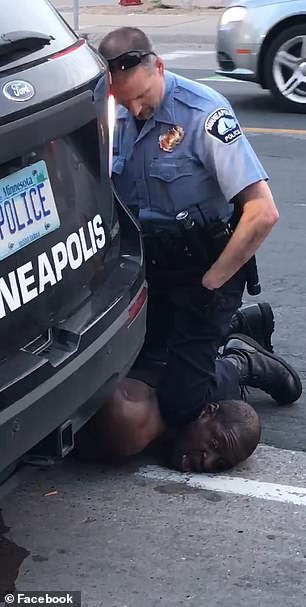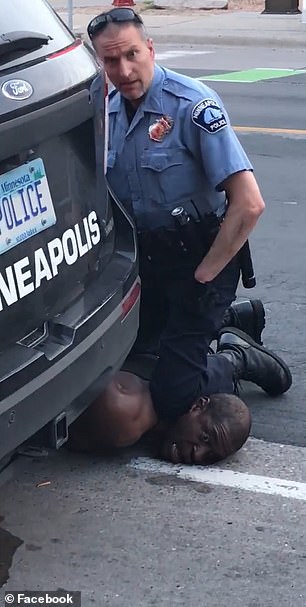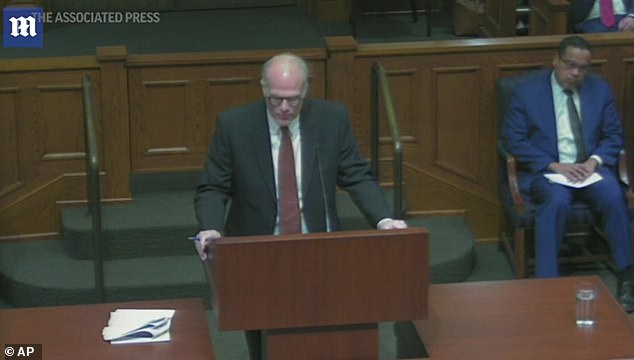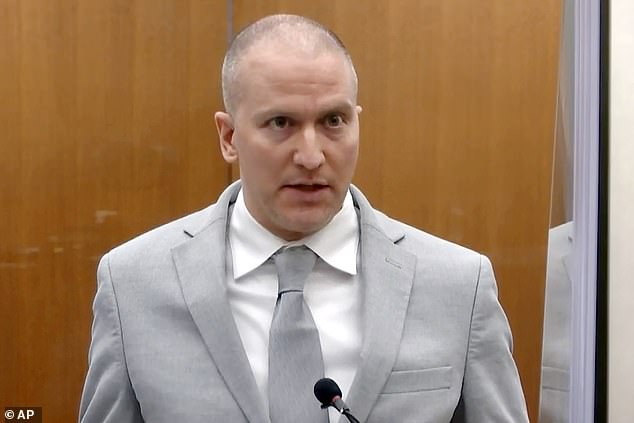Derek Chauvin has asked the Minnesota Court of Appeals to overturn his conviction in the murder of George Floyd, claiming he was denied a fair trial.
Chauvin’s attorney William Mohrman argued Wednesday that the jury was essentially “poisoned” because videos and reports of Floyd’s death were so widespread, sparking nationwide protests.
“You can’t have a trial in a community where the jury is considering the possibility of riot if the jury acquits the defendant,” Mohrman said.
The defense also requests that the court assign a new venue for a new trial.
Chauvin was sentenced to 22.5 years in prison for the murder of Floyd, and last July he received an additional 21 years on civil rights violation charges.


Ex-Minneapolis police officer Derek Chauvin has been sentenced to 22.5 years in prison for the murder of Floyd after pressing his knee against his neck for more than nine minutes

Chauvin’s attorney, William Mohrman (above), argued that the high volume of media coverage and protests over Floyd’s death meant the defendant could not get a fair trial in Minneapolis
In his argument Wednesday morning, Mohrman said the unprecedented publicity surrounding the trial had caused prejudice to build up about Chauvin’s case.
Mohrman and his team counted more than 1,000 stories and articles from local media stations citing Chauvin and claimed the coverage was “overwhelmingly hostile” to the defendant.
Video of the Minneapolis police officer pinning Floyd to the ground with the officer’s knee on the man’s neck was shared widely.
Floyd’s last words, “I can’t breathe,” also became the slogan for the Black Lives Matter movement that was erupting nationwide.
Although the majority of the protests were peaceful, the defense noted that a demonstration in Minneapolis turned into a riot that killed two people and caused “over $500,000,000 in property damage — the second most destructive riot in American history.” Story”.
Other factors leading to an allegedly unfair trial, the defense attorney said, included the city’s $27 million agreement with Floyd’s family, which was announced during jury selection, tightened security at the courthouse, and a recent police killing in the suburbs the city.
Mohrman also argued that Hennepin County Judge Pete Cahill was wrong to exclude evidence that may have been favorable to Chauvin and accused prosecutors of wrongdoing.

However, prosecutors said Chauvin (pictured during his sentencing) received a fair trial and asked that the appeal to a new trial and venue be dismissed
However, prosecutors said Chauvin had a fair trial and received a just sentence.
They said pre-trial publicity swept the state, making changing venues for the trial pointless, and that Cahill took extensive steps to ensure impartial jury selection.
They also said he took sufficient steps to protect the jury from outside influences so there was no need to seize them before deliberations.
Neal Katyal, one of the state’s prosecutors, said: “The court and the parties spent two weeks carefully selecting a jury. 44 witnesses testified, jury viewed video footage and heard from bystanders.
“They learned that Chauvin was being trained against the prone position due to positional asphyxia, which is exactly what killed Floyd. Judge Cahill conducted this trial with tremendous care,” added Katyal.
The appeals court will also consider whether it was legal to convict Chauvin of third-degree murder and whether Cahill was justified in exceeding the 12 1/2 years recommended by state sentencing guidelines.
The Court of Appeal has 90 days to rule on the case.
While Chauvin waived his right to appeal as part of his federal plea, he continued to appeal his murder convictions in state court.
Even if he wins his appeal, his federal sentence will likely keep him in prison longer than his state sentence because he would qualify for parole sooner in the state system.
Three other officers present during the killing of Floyd — Tou Thao, J. Alexander Kueng and Thomas Lane — were convicted on federal civil rights charges last February and are serving their sentences in out-of-state federal prisons.
Lane and Kueng accepted pleadings to state charges of aiding and abetted manslaughter while serving concurrent sentences. But Thao declined to plead guilty.
Lawyers for both sides agreed to let Cahill decide Thao’s guilt based on the prescribed evidence. That verdict is pending, as is his federal appeal.

